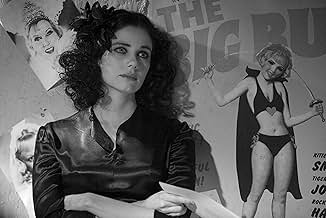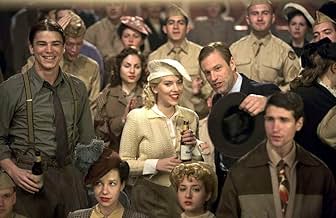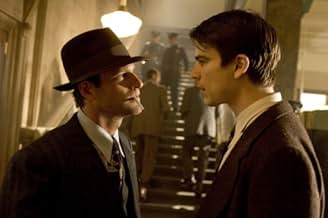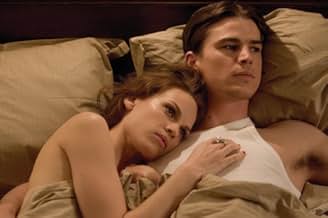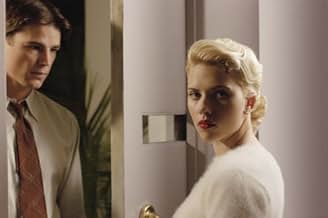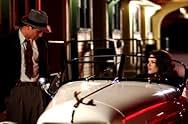CALIFICACIÓN DE IMDb
5.6/10
79 k
TU CALIFICACIÓN
Dos policías ven cómo se desmorona su vida personal y profesional al reabrir la investigación del asesinato de Elizabeth Short, "la Dalia negra".Dos policías ven cómo se desmorona su vida personal y profesional al reabrir la investigación del asesinato de Elizabeth Short, "la Dalia negra".Dos policías ven cómo se desmorona su vida personal y profesional al reabrir la investigación del asesinato de Elizabeth Short, "la Dalia negra".
- Dirección
- Guionistas
- Elenco
- Nominado a 1 premio Óscar
- 4 premios ganados y 16 nominaciones en total
Angus MacInnes
- Capt. John Tierney
- (as Angus MacInnis)
- Dirección
- Guionistas
- Todo el elenco y el equipo
- Producción, taquilla y más en IMDbPro
Opiniones destacadas
Anybody expecting to get a great account of the Black Dahlia case, even fictional, will be disappointed going in to this movie. Of course, I knew that it was a fictionalization of the case, but I had no idea the movie would present its own evidence and draw its own conclusions.
But the main problem here is not the lack of factual detail, so much as the confusion of plot that surrounds and overwhelms the Black Dahlia case itself. So much plot and character and sideplots and backstory are built around the central characters that the case itself seems like a distraction. A key plot point and character motivator is the fascination of the two detectives with the murder, but this is never elaborated enough in the film, and we're left to half-heartedly guess at the character motivations.
The tone is never consistently campy, but when the camp arrives it overwhelms the story. A dinner scene between a suspect and her family had the crowd in stitches (the only scene during which the audience laughed). The problem is that the scene is valuable to the plot and should never have been played for laughs. Hitchcock or even Lynch could have shot the same scene, with the same events and dialogue, and made it menacing and creepy, which it needed to be to function in the mystery.
Other problems: De Palma uses the lesbian angle of the movie (never a part of the case) to full exploitative advantage, and the actresses seem unable to master to the expressive 1940s style acting that would have come naturally to even a marginal 40s star.
Although the film brings a clearcut finale rather than a vague puzzle, too many loose threads come together too neatly and rather than bringing the film to a satisfactory conclusion, it leaves you scratching your head, is this what I spent the last 2 hours waiting to hear? Overall, there is too much plot, too little character development and a wildly uneven tone. The movie has its moments but it's a blinding mess all together.
But the main problem here is not the lack of factual detail, so much as the confusion of plot that surrounds and overwhelms the Black Dahlia case itself. So much plot and character and sideplots and backstory are built around the central characters that the case itself seems like a distraction. A key plot point and character motivator is the fascination of the two detectives with the murder, but this is never elaborated enough in the film, and we're left to half-heartedly guess at the character motivations.
The tone is never consistently campy, but when the camp arrives it overwhelms the story. A dinner scene between a suspect and her family had the crowd in stitches (the only scene during which the audience laughed). The problem is that the scene is valuable to the plot and should never have been played for laughs. Hitchcock or even Lynch could have shot the same scene, with the same events and dialogue, and made it menacing and creepy, which it needed to be to function in the mystery.
Other problems: De Palma uses the lesbian angle of the movie (never a part of the case) to full exploitative advantage, and the actresses seem unable to master to the expressive 1940s style acting that would have come naturally to even a marginal 40s star.
Although the film brings a clearcut finale rather than a vague puzzle, too many loose threads come together too neatly and rather than bringing the film to a satisfactory conclusion, it leaves you scratching your head, is this what I spent the last 2 hours waiting to hear? Overall, there is too much plot, too little character development and a wildly uneven tone. The movie has its moments but it's a blinding mess all together.
Have you ever been with a master storyteller who is hot? I mean in person. Its an absolutely captivating thing, watching the craft of captivating you. Its a worthy experience, even when the story isn't good. In fact, its even better when they story isn't good. You might wonder for a while why such a talented teller would choose the material she has, but will fade as you fall under spell of the storyteller, undistracted by the story. It you are lucky, she'll be a hand dancer and you will simply allow your soul to move with the undermusic.
dePalma never bothers me when he chooses bad actors, stories and such. Its just not relevant to what he has to offer, and in fact sometimes I'm thankful that the story itself doesn't get in the way. "Mission to Mars" was rewarmed tacos, but the fact that it was served by a metaphoric, genuine Spanish grandmother from her own hands was all that mattered.
About 22 minutes into this there is a wonderful crane shot, probably done without artificial assistance, beginning five minutes which is the heart of the overly complex story. It sets up two apparently unrelated threads in the story that interweave from this point. It is of the front of a building where later there will be a shooting, moves up and over the building to look at a vacant lot behind where we see a woman making a gruesome discovery. She runs to the street alongside the building where we see the car of our two cops coming to park in front and engage in a shooting. We move in front of the car to a bicyclist, who plays no role in the story. He brings us to a couple walking down the sidewalk approaching the front of the building where they will encounter our cops. We come down to street height and listen in on their conversation.
Its masterful. Even if you think everything that follows is a mess, its a glorious mess made glorious by our setting of the knitting needles.
This, my friends, is what noir is about these days: establishing an eye of god who both is us and who perturbs nature to suit conventions of coincidence in storytelling.
But there's another joy here too. The story no surprise features a film within the film. Its the whole story, there, with elements of that internal film overlapping the main story in three or four significant ways. The star of this inner film, who also is our bisected victim is a character played by Mia Kirshner. She's so much more alive and real than anyone else in the main story, I can only assume it was deliberate and a truly thrilling risk. If you follow film, you'll know her very similar and hugely complex role in "Exotica," a landmark film.
Two major experiences in a film! Of course its worth watching!
Ted's Evaluation -- 3 of 3: Worth watching.
dePalma never bothers me when he chooses bad actors, stories and such. Its just not relevant to what he has to offer, and in fact sometimes I'm thankful that the story itself doesn't get in the way. "Mission to Mars" was rewarmed tacos, but the fact that it was served by a metaphoric, genuine Spanish grandmother from her own hands was all that mattered.
About 22 minutes into this there is a wonderful crane shot, probably done without artificial assistance, beginning five minutes which is the heart of the overly complex story. It sets up two apparently unrelated threads in the story that interweave from this point. It is of the front of a building where later there will be a shooting, moves up and over the building to look at a vacant lot behind where we see a woman making a gruesome discovery. She runs to the street alongside the building where we see the car of our two cops coming to park in front and engage in a shooting. We move in front of the car to a bicyclist, who plays no role in the story. He brings us to a couple walking down the sidewalk approaching the front of the building where they will encounter our cops. We come down to street height and listen in on their conversation.
Its masterful. Even if you think everything that follows is a mess, its a glorious mess made glorious by our setting of the knitting needles.
This, my friends, is what noir is about these days: establishing an eye of god who both is us and who perturbs nature to suit conventions of coincidence in storytelling.
But there's another joy here too. The story no surprise features a film within the film. Its the whole story, there, with elements of that internal film overlapping the main story in three or four significant ways. The star of this inner film, who also is our bisected victim is a character played by Mia Kirshner. She's so much more alive and real than anyone else in the main story, I can only assume it was deliberate and a truly thrilling risk. If you follow film, you'll know her very similar and hugely complex role in "Exotica," a landmark film.
Two major experiences in a film! Of course its worth watching!
Ted's Evaluation -- 3 of 3: Worth watching.
It has been almost ten years since Curtis Hanson delivered what was arguably the best picture of 1997, L.A. Confidential. That movie was great in almost every way (my key dislike was only in the performance of Kim Basinger, yet the Academy did not agree with me), and a big part of that was due to the source material from James Ellroy. And now comes The Black Dahlia, another one of Ellroy's books based on detectives in the 1940's, only revolving around a real event and having master filmmaker Brian De Palma at the helm. And unfortunately, the film comes with mixed results.
After taking part in a boxing match which ends up giving a whole lot more power to the L.A.P.D., Dwight "Bucky" Bleichert (Josh Hartnett) and Leland "Lee" Blanchard (Aaron Eckhart) are promoted to detectives and become partners. Shortly afterwards, they become entangled in the brutal murder of Elizabeth Short (Mia Kirshner), otherwise known as the titular Black Dahlia. What follows for them is a tale of corruption, greed and vengeance. It may not seem like much (not too mention the femme fatales of Scarlett Johansson and Hilary Swank), but the film really has a lot going on.
And this is where a bit of the problems lie.
Some of the events that occur over the course of the film, are just completely random and almost unexplainable. Hell, random subplots appear and disappear faster than they come up. When it really starts getting down to business, the movie becomes downright confusing, and the narrative does not let up for anyone to truly figure it all out. It gets especially bizarre in the final act, when almost nothing truly makes sense, and we just have to sit and just contend with what ends up happening. It makes it seem like they want the audience to sift through and determine what is relevant to the film and what is not, and only then can they truly grasp onto a full understanding. Even after watching the film a few hours ago, I still question some of the things that happened.
I think one of the key reasons it does not make a whole whack of sense is the fact that it revolves around a real event. Last week's Hollywoodland had this same problem in that the filmmakers do not seem to have an idea of where to draw your attention. Do they want the focus on the murder itself, or do they want the focus on the cops investigating it? Adding in a few seemingly bizarre backstories does not help this either. They seem to strike gold when they focalize on what the murder and its impending investigation is doing to Bucky and Lee, but they do not spend enough time expressing it. They touch on it in passing, and instead, cut to either useless items, or completely random things. You can tell that there is some form of direction however, just not enough.
Hartnett plays Bucky very smoothly, and does a very adequate job in his narration. He really lacks the zest to make his character interesting however, and has a really tough time trying to make the audience care about him. He just does not seem to have the hard-boiled cop schtick nailed down here, and only comes off as a little less than soft-boiled. Eckhart on the other hand, does have the zest and really shines through as Lee. His character goes through most of the changing during the film, and you can see the dramatic change of character as the film progresses. He just does not have nearly enough screen time to truly flesh him from being the strange and mysterious character.
Johansson does well for herself as the girl stuck between the two partners, and only sparingly gets the opportunity to stretch out her enigmatic character. Swank on the other hand, feels completely useless in the scheme of things (until her character actually serves a purpose later in the film). Her disappear/reappearing Scottish accent is laughable, and her whole performance really begs the question of how she has managed to snag two Best Actress Oscars in less than ten years. Supporting work, especially from Mike Starr, Fiona Shaw and the flashback heavy Kirshner, are all on the mark and are fairly well done in their limited roles.
Whereas there were problems with many other things, there are none with the sets, costumes and cinematography. This is 1940's Los Angeles, and it looks gorgeous. Every single minute detail seems to have been polished and amped up to the point of looking like it was filmed sixty years ago. It makes the film feel more realistic than it is, and makes the sheer "coolness" of the settings and characters stand right out. Although it may be advertised as being noir, it really is nowhere near as dark as it could have been. Yet, it still has enough packed into it to make this film visually astonishing.
Another standout is the feel of it being a De Palma film. The camera angles, the slow motion, the violence, the sheer editing of it all (especially the worn black and white film clips of Kirshner as Short), just screams old school De Palma. From the start, even with its problems, the audience knows it is in the hands of a style master, and in that regard, the film is consistent and on the mark.
But unfortunately, that same phrase cannot be used to describe the rest of the film. It is truly a mixed bag, but despite its confusing narrative, it is still interesting and stylish as hell. But I still cannot help but be disappointed overall. I guess I was just expecting a whole lot more.
7/10.
After taking part in a boxing match which ends up giving a whole lot more power to the L.A.P.D., Dwight "Bucky" Bleichert (Josh Hartnett) and Leland "Lee" Blanchard (Aaron Eckhart) are promoted to detectives and become partners. Shortly afterwards, they become entangled in the brutal murder of Elizabeth Short (Mia Kirshner), otherwise known as the titular Black Dahlia. What follows for them is a tale of corruption, greed and vengeance. It may not seem like much (not too mention the femme fatales of Scarlett Johansson and Hilary Swank), but the film really has a lot going on.
And this is where a bit of the problems lie.
Some of the events that occur over the course of the film, are just completely random and almost unexplainable. Hell, random subplots appear and disappear faster than they come up. When it really starts getting down to business, the movie becomes downright confusing, and the narrative does not let up for anyone to truly figure it all out. It gets especially bizarre in the final act, when almost nothing truly makes sense, and we just have to sit and just contend with what ends up happening. It makes it seem like they want the audience to sift through and determine what is relevant to the film and what is not, and only then can they truly grasp onto a full understanding. Even after watching the film a few hours ago, I still question some of the things that happened.
I think one of the key reasons it does not make a whole whack of sense is the fact that it revolves around a real event. Last week's Hollywoodland had this same problem in that the filmmakers do not seem to have an idea of where to draw your attention. Do they want the focus on the murder itself, or do they want the focus on the cops investigating it? Adding in a few seemingly bizarre backstories does not help this either. They seem to strike gold when they focalize on what the murder and its impending investigation is doing to Bucky and Lee, but they do not spend enough time expressing it. They touch on it in passing, and instead, cut to either useless items, or completely random things. You can tell that there is some form of direction however, just not enough.
Hartnett plays Bucky very smoothly, and does a very adequate job in his narration. He really lacks the zest to make his character interesting however, and has a really tough time trying to make the audience care about him. He just does not seem to have the hard-boiled cop schtick nailed down here, and only comes off as a little less than soft-boiled. Eckhart on the other hand, does have the zest and really shines through as Lee. His character goes through most of the changing during the film, and you can see the dramatic change of character as the film progresses. He just does not have nearly enough screen time to truly flesh him from being the strange and mysterious character.
Johansson does well for herself as the girl stuck between the two partners, and only sparingly gets the opportunity to stretch out her enigmatic character. Swank on the other hand, feels completely useless in the scheme of things (until her character actually serves a purpose later in the film). Her disappear/reappearing Scottish accent is laughable, and her whole performance really begs the question of how she has managed to snag two Best Actress Oscars in less than ten years. Supporting work, especially from Mike Starr, Fiona Shaw and the flashback heavy Kirshner, are all on the mark and are fairly well done in their limited roles.
Whereas there were problems with many other things, there are none with the sets, costumes and cinematography. This is 1940's Los Angeles, and it looks gorgeous. Every single minute detail seems to have been polished and amped up to the point of looking like it was filmed sixty years ago. It makes the film feel more realistic than it is, and makes the sheer "coolness" of the settings and characters stand right out. Although it may be advertised as being noir, it really is nowhere near as dark as it could have been. Yet, it still has enough packed into it to make this film visually astonishing.
Another standout is the feel of it being a De Palma film. The camera angles, the slow motion, the violence, the sheer editing of it all (especially the worn black and white film clips of Kirshner as Short), just screams old school De Palma. From the start, even with its problems, the audience knows it is in the hands of a style master, and in that regard, the film is consistent and on the mark.
But unfortunately, that same phrase cannot be used to describe the rest of the film. It is truly a mixed bag, but despite its confusing narrative, it is still interesting and stylish as hell. But I still cannot help but be disappointed overall. I guess I was just expecting a whole lot more.
7/10.
De Palma's staged, theatrical style has always felt like an in-joke: an expressive homage (or sometimes a slap in the face) to the conventions of cinema. And in the case of his high- energy thrillers, the joke is funny and damned entertaining. But in the case of his dramas, De Palma constantly walks a thin line between evocative melodrama and camp (The wonderful "Carlito's Way," in my opinion, is the exception). And "The Black Dahlia" often steps over that line.
With a steady build-up of noir conventions, the film hearkens to the expressionistic film and acting styles of the 40's -- a style which can induce giggles in audiences raised on irony. And I can count a few musical swells, flamboyant acting choices and dramatic fade-outs which caused unwanted comic relief. Or did it? If there's one thing De Palma loves more than entertaining his audience, it's confounding them. How else do you explain the two-hour joke that was "Raising Cain"? (Although I, for one, found that particular joke damned funny).
You watch "Dahlia" with the distinct impression that De Palma is enjoying every minute of it. He's copying Wilder, Welles and, you guessed it, Hitchcock -- and he's having a blast doing it. So when Josh Hartnett's character pulls a full dinner setting (including the turkey) off a table and throws Scarlett Johansson down lustfully upon it, should we also smile and remember "Double Indemnity"? I guess it would help if you've seen "Double Indemnity."
That said, the film's biggest flaw is that it smiles at itself for so long that it leaves little time to wrap up the plot. The onslaught of last-reel revelations seems to exist only to give the actors more opportunity to relish in the delicious mood De Palma has created. We never really cared about the plot in the first place because De Palma didn't care about it either. He's more interested in the shadows, the thrills, the drama, the lurking killers, swelling music, lusty confrontations and blood splatters. And the plot points get lost somewhere in the mix. So who can blame us for glazing over when Hartnett finally starts to care about the mysteries rather than just being mystified by them? De Palma has painted such an odd, exciting picture (even when it turns to camp) that the audience would rather keep watching the elaborate set-ups than sit through the convoluted solutions.
But then again, what good is a joke without a satisfying punch line?
With a steady build-up of noir conventions, the film hearkens to the expressionistic film and acting styles of the 40's -- a style which can induce giggles in audiences raised on irony. And I can count a few musical swells, flamboyant acting choices and dramatic fade-outs which caused unwanted comic relief. Or did it? If there's one thing De Palma loves more than entertaining his audience, it's confounding them. How else do you explain the two-hour joke that was "Raising Cain"? (Although I, for one, found that particular joke damned funny).
You watch "Dahlia" with the distinct impression that De Palma is enjoying every minute of it. He's copying Wilder, Welles and, you guessed it, Hitchcock -- and he's having a blast doing it. So when Josh Hartnett's character pulls a full dinner setting (including the turkey) off a table and throws Scarlett Johansson down lustfully upon it, should we also smile and remember "Double Indemnity"? I guess it would help if you've seen "Double Indemnity."
That said, the film's biggest flaw is that it smiles at itself for so long that it leaves little time to wrap up the plot. The onslaught of last-reel revelations seems to exist only to give the actors more opportunity to relish in the delicious mood De Palma has created. We never really cared about the plot in the first place because De Palma didn't care about it either. He's more interested in the shadows, the thrills, the drama, the lurking killers, swelling music, lusty confrontations and blood splatters. And the plot points get lost somewhere in the mix. So who can blame us for glazing over when Hartnett finally starts to care about the mysteries rather than just being mystified by them? De Palma has painted such an odd, exciting picture (even when it turns to camp) that the audience would rather keep watching the elaborate set-ups than sit through the convoluted solutions.
But then again, what good is a joke without a satisfying punch line?
I was disappointed in this film mainly because I love James Elroy's books and found that this film did not do it justice. The characters in the film became stereotypes or cardboard 40's characters. Scarlett Johannsen looked like a young Lana Turner on tranquilizers.........very little emotion, so much mumbling.............poor Hilary Swank was just too distracting in her black wig trying to be a 40's vamp ...........I guess we are not accustomed to seeing her that way and she evidently does not do well in sexy, seductive roles............Josh Hartnett did pretty well.........although the constant taking off of clothing of his different ladies seemed a bit tiresome......if I would have had this on video I would have fast forwarded the constant "clothes removal" scenes. James Ellroy also wrote LA Confidential and that was a masterpiece on film.........but of course, the actors were Russell Crowe, Kevin Spacey, Danny Divito, and many very well seasoned actors with a far above average script. Sorry to say that this film is not academy award material as LA Confidential was................Ellroy's stories can be told on film with good writing, competent acting, good casting, good screenplay and continuity. This was not present in The Black Dahlia. Actually, the girl who played The Black Dahlia was the most sensitive and sympathetic and portrayed her character excellently.
¿Sabías que…?
- TriviaWhen Dwight "Bucky" Bleichert goes searching through some photographs, you can see a real autopsy photo of Elizabeth Short.
- ErroresWhen Bucky Bleichert enters Sheryl Saddon's bedroom to get the suitcase, there is a postcard-sized picture of Bettie Page on the wall. Bettie Page did not start modeling until 1950.
- Citas
Emmet Linscott: What kind of name is Bleichert? Dutch?
Ofcr. Dwight "Bucky" Bleichert: German.
Emmet Linscott: Ah, a great people, the Germans. Hitler was a bit excessive. But mark my words that someday we'll regret not joining forces with him to fight the Reds.
- Bandas sonorasIn the Mood
Written by Joe Garland (as Joseph C. Garland)
Used by Permission of Shapiro Bernstein & Co. Inc. (ASCAP)
Selecciones populares
Inicia sesión para calificar y agrega a la lista de videos para obtener recomendaciones personalizadas
Detalles
- Fecha de lanzamiento
- Países de origen
- Idiomas
- También se conoce como
- The Black Dahlia
- Locaciones de filmación
- Productoras
- Ver más créditos de la compañía en IMDbPro
Taquilla
- Presupuesto
- USD 50,000,000 (estimado)
- Total en EE. UU. y Canadá
- USD 22,545,080
- Fin de semana de estreno en EE. UU. y Canadá
- USD 10,005,895
- 17 sep 2006
- Total a nivel mundial
- USD 49,332,692
- Tiempo de ejecución
- 2h 1min(121 min)
- Color
- Mezcla de sonido
- Relación de aspecto
- 2.35 : 1
Contribuir a esta página
Sugiere una edición o agrega el contenido que falta







